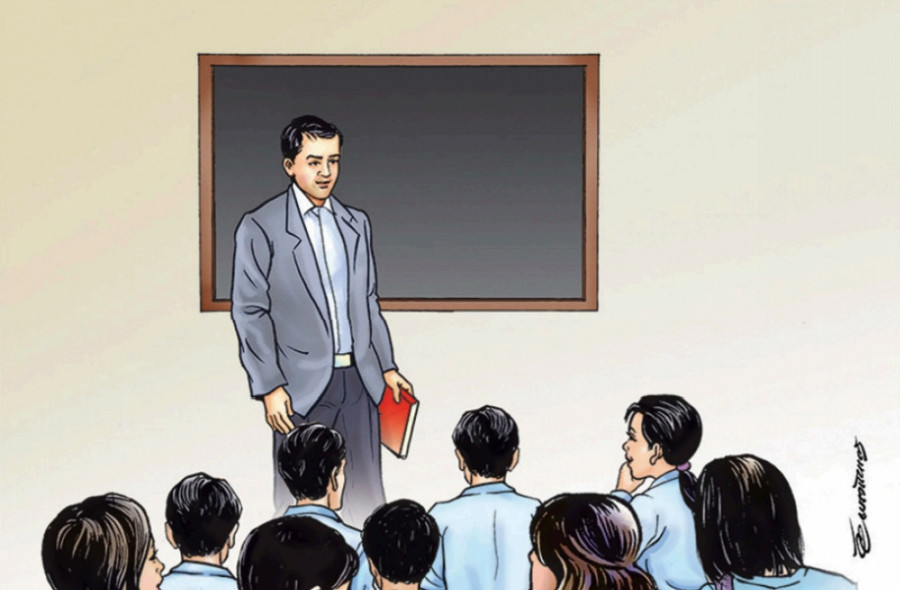Columns
Technical teachers’ licensing system
This will be an excellent mechanism for separating trained and untrained teachers.
Rajendra Prasad Adhikari
Quality technical teachers are paramount for the delivery of quality technical education. Teachers are the primary instrument to produce competent technical human resources equipped with adequate skills and ready to undertake the job or start their own business as entrepreneurs or become self-employed. Quality technical teachers are hard to come by. This is the reality, but even we teachers are not in a position to accept this fact, and are pretending to be competent teachers. Either ego or fear of change prevents us from accepting this reality.
In the last few years, politicians have talked a lot about technical education and securing their politics. They keep putting their efforts into expanding technical schools despite numerous issues related to delivering quality technical education, developing quality technical teachers with 21st-century skills, and creating adequate job opportunities in the market. Consequently, technical education has not been able to attract a significant portion of the youth population or dissuade them from leaving the country and engage with industries effectively to create employment opportunities.
Increasing the number
Industries openly say that they are comfortable working with non-Nepali technicians and operators because they possess "the skills" required by the industry. In terms of "attitude" they are easier to handle. Despite employing efforts to resolve these anomalies by profoundly analysing the underlying causes, politicians are only interested in increasing the number of technical schools in the country, which is merely a waste of public funds and ruins the future of Nepali youths. This is why even with more than 90 years of experience in technical education, we have not been able to establish and stabilise a proper, result-oriented system.
The history of skills can be traced back to the Lichchhavi period. However, the formal start of technical education dates from 1930 when an engineering school was established to provide vocational training. We can take the example of Singapore when talking about technical education and economic development. Singapore became an independent country in 1965, and leapt forward in economic development by focusing on technical education and industrialisation. We need to learn from others' experiences and bring changes in our existing behaviour and attitude. Primarily, our approach has been serving petty political interests and fulfilling self-interests.
Under the Council of Technical Education and Vocational Training (CTEVT) there are 63 constituent schools, 572 community schools that offer technical education, 42 partnering schools and 429 privately managed schools. Altogether, they are 1,106 in number. The irony is that the enrolment rate in technical education is less than 75 percent of the available seats. This shows that there is underutilisation of the available capacity. In 2013, without looking at this scenario, the Ministry of Education started parallel programmes as a technical stream in community schools, and the number of such schools has reached 484. Here, two crucial questions arise: Do these schools have adequate technical teachers and the ambience required for technical education? And do the teachers who are currently involved in technical education have the necessary qualities? We cannot produce quality technical human resources in the absence of quality teachers.
A discussion has started in the country for the implementation of a technical teacher licensing system. Technical education experts raised a critical question at a forum, "Where are the teachers?" The present teachers lack industry experience, and the industry persons lack knowledge and pedagogy. The integration of industry experience, knowledge and pedagogy in a person to make a quality teacher has been a massive challenge; hence, vision led by patience and realistic planning with measurable output is an essential requirement to address this problem.
The technical teacher licensing system can be introduced based on competency and maybe graded into three or four levels. The technical teacher licensing system helps integrate technical teachers through a plan. The authority will have information on their competency level, which allows the design of need-based training and appropriate means of imparting training for continuous upgrading of technical teachers. This also opens a career path, from level-1 to level-3/level-4, and contributes to improving the social image and thereby help to attract competent persons to become technical teachers. This will be an excellent mechanism for distinguishing certified (trained) specialised teachers from non-certified (untrained) ones. To establish a system for this change, the government should express its commitment and allocate a budget for the initial few years (three to five years).
It would be beneficial for the government to insist on, support and facilitate technical schools, both public and private, to go for the Asia Pacific Accreditation and Certification Commission's (APACC) certification. With participants from 17 member countries, including Nepal, Colombo Plan Staff College convened an International Conference on Accreditation and Certification in December 2004, establishing the APACC. This certification assures that our technical schools are equal to comparable institutions in the region and possess specific standards of quality as defined by the accreditation agency. The APACC provides five different awards, ranging from bronze to platinum, based on an independent third-party evaluation. CTEVT authorities have to think responsibly and act accordingly for the accreditation of technical schools operating under it.
Policy-level intervention
The implementation of the technical teacher licensing system also requires alignment with the national qualification framework; and for effective implementation of the framework, a good understanding of the purpose and importance is needed. Most of them are again likely to resist these kinds of changes. Hence, the national qualification framework and technical teacher licensing system must be incorporated into law, that is, in the eagerly awaited new Education Act. For this, the leader of technical education in the country, the CTEVT, needs to take the lead and be proactive and should advocate.
Positive reforms in technical education are a must for the country's overall economic development because it helps increase the competitiveness of industry and creates employment opportunities, thereby reducing unemployment and contributing to the overall GDP. Therefore, positive, conscious and planned reform in this sector naturally requires high-level political and policy-level intervention and strategic moves based on an applicable timeframe and measurable output, which is still a big challenge in our context.




 9.7°C Kathmandu
9.7°C Kathmandu















